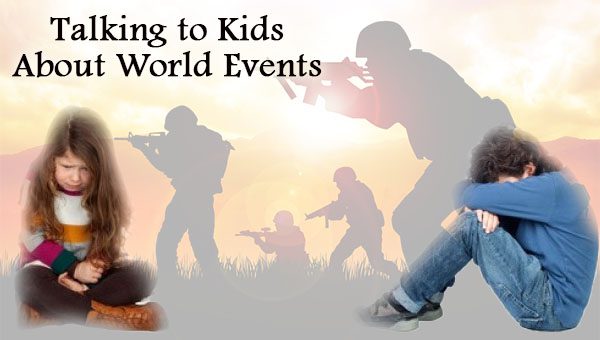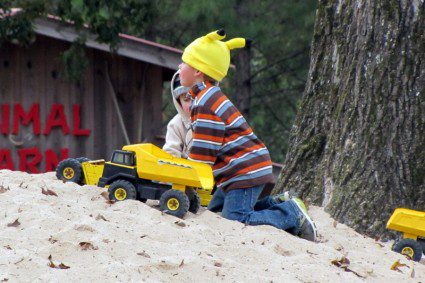Talking to Kids About World Events
The often tragic realities of world events such as military conflicts, acts of terrorism and other disasters can be difficult for even educated, worldly adults to fully comprehend. Understanding these things can be even harder for young children, who may react with any number of emotions or responses. It’s essential for parents to talk openly and honestly with kids, and to help them develop the skills they will need to process ideas and events that might otherwise confuse or overwhelm them.

Trauma psychologist Robert R. Butterworth, Ph.D. is a widely recognized and highly respected expert in human reaction to violence, trauma and stress, and is particularly knowledgeable in how children cope during times of tragedy and disaster. For nearly two decades, Dr. Butterworth has served as a guest and expert analyst on radio and television, and has written pieces that have appeared in most of the major newspapers in the United States and worldwide. Here he offers advice for talking honestly with your children about tragic events:
Discuss their feelings.
According to Dr. Butterworth, it’s very important for parents to sit down and talk to children during times of war or other tragedies. Kids will react with their own emotions to news stories, things they hear in school, or things they overhear parents discussing. It’s a parent’s role to find out what sorts of things kids are thinking, and what their feelings about these events might be. Ask questions about what’s going on at school, what your child knows about the crisis, and how these things make him or her feel.
Age 7 and under: draw, use props.
When you sit down to talk with a child seven years old or younger, Butterworth suggests having props, like paper and crayons, at the ready. Since very young kids can have trouble verbalizing emotions and may not want to sit and talk seriously, you may have a better shot at understanding how they really feel if you let them draw out the things that are on their minds.
Older kids: research together.
Older kids and teenagers might be doing a lot of thinking on their own, and may come up with questions about complex political issues. If you don’t know the answers, or even if you do, it’s often a good idea to research the issue with your kids. Surf the Internet together or head to the library to find books on such topics as the roots of terrorism, the history of a specific conflict, or the nature of peacemaking efforts.
Make talking an ongoing routine.
Dr. Butterworth believes that you shouldn’t force kids to discuss something that they’re not ready to talk about. A better idea is to foster an atmosphere where open discussion is encouraged and welcomed. Try to set aside a time to talk about important issues and events and make it a regular part of family life. Once kids are comfortable with the idea of free talk, they might use that time to open up about how they’re feeling, and talk to you about the things, that really impact their lives at home and in the wider world.
More Ideas:
Have answers for the big questions.
When expressing their fears about what’s going on in the world, children will often focus on the heavyweight questions. Are we going to die? Why is there war? When will it be over? What’s happening to kids on the other side? Think about questions like this, and have your answers ready. Do your best to reassure your children that you will keep them safe.
Understand that fear is normal.
Don’t make light of your child’s fear. Let him or her know that being afraid is perfectly normal, and that talking about scary things can go a long way towards reducing that fear.
Listen
Make sure you listen to your kids as much as you talk to them. If you’re hung up on giving a lecture, you might not get a real sense of what a child is thinking and going through.
Separate fantasy from reality.
Kids are bombarded with so many images and ideas from the media that it can sometimes blend together in their heads. Listen to what they say about war and terrorism and look for signs that they have hooked onto things from movies, video games or fantasies. Things in the world can be scary, but kids get even more frightened when fictional ideas of monsters combine with what’s really happening.
Talk with their teachers.
Make sure you know what your kids are learning about war, terrorism and disasters at school. Share information with your children’s teachers so the teachers will know of any issues you have noticed, and vice versa. Ask the teacher what kids are saying about the situation in class, and if there have been any incidents of bullying, prejudice, or other signs that anxiety is impacting the children. Then, talk about these things with your kids.
For more information about helping kids understand and cope with disturbing events, check out the following organizations or websites:
New York Newsday: Talking to Your Children About War
www.nynewsday.com/news/education/
About Our Kids: Talking to Kids About Terrorism or Acts of War
www.aboutourkids.org/articles/war.html
PBS Parents: Talking with Kids About War & Violence
www.pbs.org/parents/issuesadvice/war/
Talking with Kids about War: Pointers for Parents
www.familyeducation.com/article/0,1120,1-4412,00.html
NC State University: Talking to Children about Terrorism and Armed Conflict
www.ces.ncsu.edu/depts/fcs/pub/2002w/myers-wall.html
North Dakota State University: Talking to Your Children About Armed Conflict
www.ext.nodak.edu/extpubs/yf/famsci/he477w.htm

